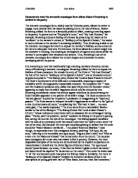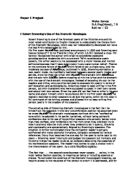Yet the persona, who is the prime focus of dramatic monologues, contradicts Galuppi’s message, and the poem’s structure accentuates this contradiction. The structure is actually one of the most interesting parts of the poem, because a rigid trochaic octameter with fifteen perfect tersest is definitely a tall task. While Browning’s technical skill reflects Galuppi’s mastery with the clavichord, the meter, which is tripping and playful at times, belies the music’s message. In addition, the open-ended rhymes like ‘day’ and ‘May’, and the overabundance of questions and exclamations with impart a gaiety to the tone, support the persona’s philosophy of hedonism.
For the persona, who is probably listening to Galuppi, Galuppi’s ‘meaning’ is so obvious that only a ‘deaf and blind’ person could ‘misconceive’ it. This having been said at the very outset of the poem, the persona then ridicules Galuppi’s music. He says he takes it with ‘such a heavy mind’, the emphatic showing overtones of sarcasm, as does the dismissive tone in ‘Here you come with your old music, and here’s all the good it brings.’ Here, the anapest in ‘your old music’ deviates from the regular trochaic pattern and thus resonates the persona’s dissatisfaction with it. Another of Browning’s structural techniques is repetition, in the seventh stanza when the persona describes the chords: ‘Those lesser thirds…/ Those suspensions, those solutions - .. Those commiserating sevenths’. This repetition spreads through the whole stanza, and it demonstrates the persona’s sarcasm, as if he’s making fun of Galuppi’s overtly desperate attempt to instill responsibility in his listeners.
Indeed, Galuppi seems to regard his listeners as indolent fools, an attitude the persona believes is sanctimonious and priggish. Browning has described both the persona’s feelings and the persona’s interpretation of Galuppi’s feelings randomly throughout the poem, and this alternation of views makes the persona’s criticism of Galuppi very prominent. For example, in the fourth and fifth stanzas Galuppi criticizes the vain Venetian lifestyle, from those who ‘take their pleasure’ to those who dance from midnight to midday. Here, Browning’s diction, with ‘take’ and ‘burning’ portray the Venetians as avaricious and passionate, while the open rhymes are cheerful and reflect the hedonistic ideology of the Venetians. This mood is juxtaposed with Galuppi’s morose music in the seventh stanza, and the philosophies of hedonism and pragmatism (with Galuppi constantly reminding the listeners of their mortality) are consequentially also juxtaposed. In the seventh stanza, the consonance of ‘s’ in ‘suspensions’, ‘sixths’, ‘sigh’, etc. creates an eerie, melancholy feeling, while the persona’s image of Galuppi as a ghostly cricket has a haunting feel to it. Later in the poem, Galuppi’s music seems to be saying that Venetians were ‘merely born to bloom and drop’, like flowers whose lives are ephemeral. Stanzas with this theme of mortality (twelve, fourteen and fifteen), have closed rhymes, like ‘drop’ and ‘crop’ or ‘gold’ and ‘old’. Thus, the difference in rhyming words also accentuates the difference in the Venetian lifestyle and Galuppi’s ideals.
Yet Galuppi’s preaching seem to have little effect on the audience. Indeed, the persona notes, with some glee, that they’d ‘break talk off’ only to flirt, not to admire his music, and even when they extolled him, they would do it while he played, not even waiting for him to complete his piece. This shows that Galuppi wasn’t really respected, prompting the persona to exclaim, in a flippant tone, ‘Oh, they praised you, I dare say!’, with the caesuras indicating that he’s having fun while making fun of the musician.
‘A Toccata of Galuppi’s’ ends on a grave note, with the persona, after having observed that for all the self-righteousness Galuppi contained, the fact is, he is not a renowned musician, and hasn’t himself made much of a mark on the world. Yet, the last, very poignant line, has the persona acceding that he feels ‘chilly and grown’, which suggests that maybe Browning, despite his creation of a persona with opposite feelings, felt that there was some substance to Galuppi’s music, that life really did need to be more than just fun and games. Browning, who has always dealt with art and its influence on our lives, leaves us with a lingering thought on Galuppi’s message, and how much attention we ought to pay to it.







